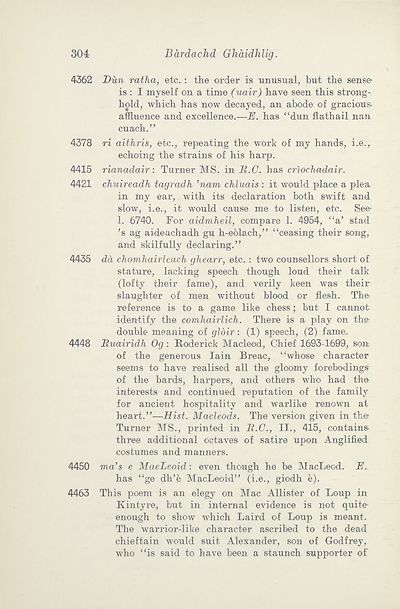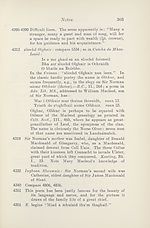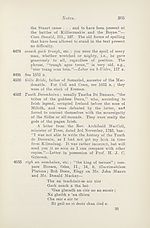Download files
Complete book:
Individual page:
Thumbnail gallery: Grid view | List view

304
Bardachd Ghaidhlig.
4362 Dim ratha, etc.: the order is unusual, but the sense’
is : I myself on a time (uair) have seen this strong¬
hold, which has now decayed, an abode of gracious,
affluence and excellence.—E. has “dun flathail nan
cuach.”
4378 ri aithris, etc., repeating the work of my hands, i.e.,
echoing the strains of his harp.
4415 rianadair: Turner MS. in It.C. has criochadair.
4421 chuireadh tagradh ’nam chluais : it would place a plea
in my ear, with its declaration both swift and
slow, i.e., it would cause me to listen, etc. See-
1. 6740. For aidmheil, compare 1. 4954, “a’ stad
’s ag aideachadh gu h-eolach,” “ceasing their song,
and skilfully declaring.”
4435 dd chomhairleach ghearr, etc. : two counsellors short of
stature, lacking speech though loud their talk
(lofty their fame), and verily keen was their
slaughter of men without blood or flesh. The-
reference is to a game like chess; but I cannot
identify the comhairlich. There is a play on the
double meaning of glbir: (1) speech, (2) fame.
4448 Ruairidh Og: Roderick Macleod, Chief 1693-1699, son
of the generous Iain Breac, “whose character
seems to have realised all the gloomy forebodings
of the bards, harpers, and others who had the
interests and continued reputation of the family
for ancient hospitality and warlike renown at
heart.”—Hist. Macleods. The version given in the
Turner MS., printed in R.C., II., 415, contains
three additional octaves of satire upon Anglified
costumes and manners.
4450 ma’s e MacLcoid: even though he be MacLeod. E.
has “ge dh’b MacLeoid” (i.e., giodh e).
4463 This poem is an elegy on Mac Allister of Loup in
Kintyre, but in internal evidence is not quite
enough to show which Laird of Loup is meant.
The warrior-like character ascribed to the dead
chieftain would suit Alexander, son of Godfrey,
who “is said to have been a staunch supporter of
Bardachd Ghaidhlig.
4362 Dim ratha, etc.: the order is unusual, but the sense’
is : I myself on a time (uair) have seen this strong¬
hold, which has now decayed, an abode of gracious,
affluence and excellence.—E. has “dun flathail nan
cuach.”
4378 ri aithris, etc., repeating the work of my hands, i.e.,
echoing the strains of his harp.
4415 rianadair: Turner MS. in It.C. has criochadair.
4421 chuireadh tagradh ’nam chluais : it would place a plea
in my ear, with its declaration both swift and
slow, i.e., it would cause me to listen, etc. See-
1. 6740. For aidmheil, compare 1. 4954, “a’ stad
’s ag aideachadh gu h-eolach,” “ceasing their song,
and skilfully declaring.”
4435 dd chomhairleach ghearr, etc. : two counsellors short of
stature, lacking speech though loud their talk
(lofty their fame), and verily keen was their
slaughter of men without blood or flesh. The-
reference is to a game like chess; but I cannot
identify the comhairlich. There is a play on the
double meaning of glbir: (1) speech, (2) fame.
4448 Ruairidh Og: Roderick Macleod, Chief 1693-1699, son
of the generous Iain Breac, “whose character
seems to have realised all the gloomy forebodings
of the bards, harpers, and others who had the
interests and continued reputation of the family
for ancient hospitality and warlike renown at
heart.”—Hist. Macleods. The version given in the
Turner MS., printed in R.C., II., 415, contains
three additional octaves of satire upon Anglified
costumes and manners.
4450 ma’s e MacLcoid: even though he be MacLeod. E.
has “ge dh’b MacLeoid” (i.e., giodh e).
4463 This poem is an elegy on Mac Allister of Loup in
Kintyre, but in internal evidence is not quite
enough to show which Laird of Loup is meant.
The warrior-like character ascribed to the dead
chieftain would suit Alexander, son of Godfrey,
who “is said to have been a staunch supporter of
Set display mode to:
![]() Universal Viewer |
Universal Viewer | ![]() Mirador |
Large image | Transcription
Mirador |
Large image | Transcription
| An Comunn Gàidhealach > An Comunn Gàidhealach Publications > Bardachd Ghaidhlig > (372) |
|---|
| Permanent URL | https://digital.nls.uk/126285596 |
|---|
| Description | This contains items published by An Comunn, which are not specifically Mòd-related. It includes journals, annual reports and corporate documents, policy statements, educational resources and published plays and literature. It is arranged alphabetically by title. |
|---|
| Description | A collection of over 400 items published by An Comunn Gàidhealach, the organisation which promotes Gaelic language and culture and organises the Royal National Mòd. Dating from 1891 up to the present day, the collection includes journals and newspapers, annual reports, educational materials, national Mòd programmes, published Mòd literature and music. |
|---|---|
| Additional NLS resources: |
|

